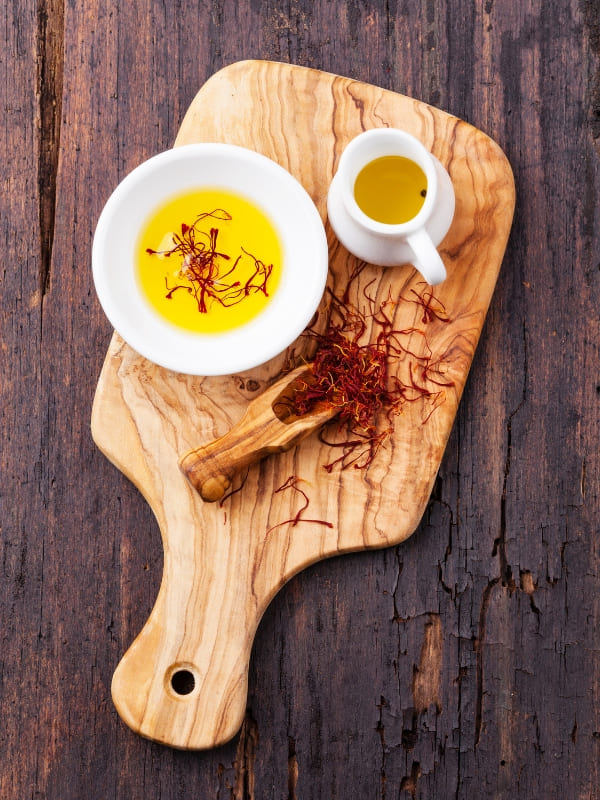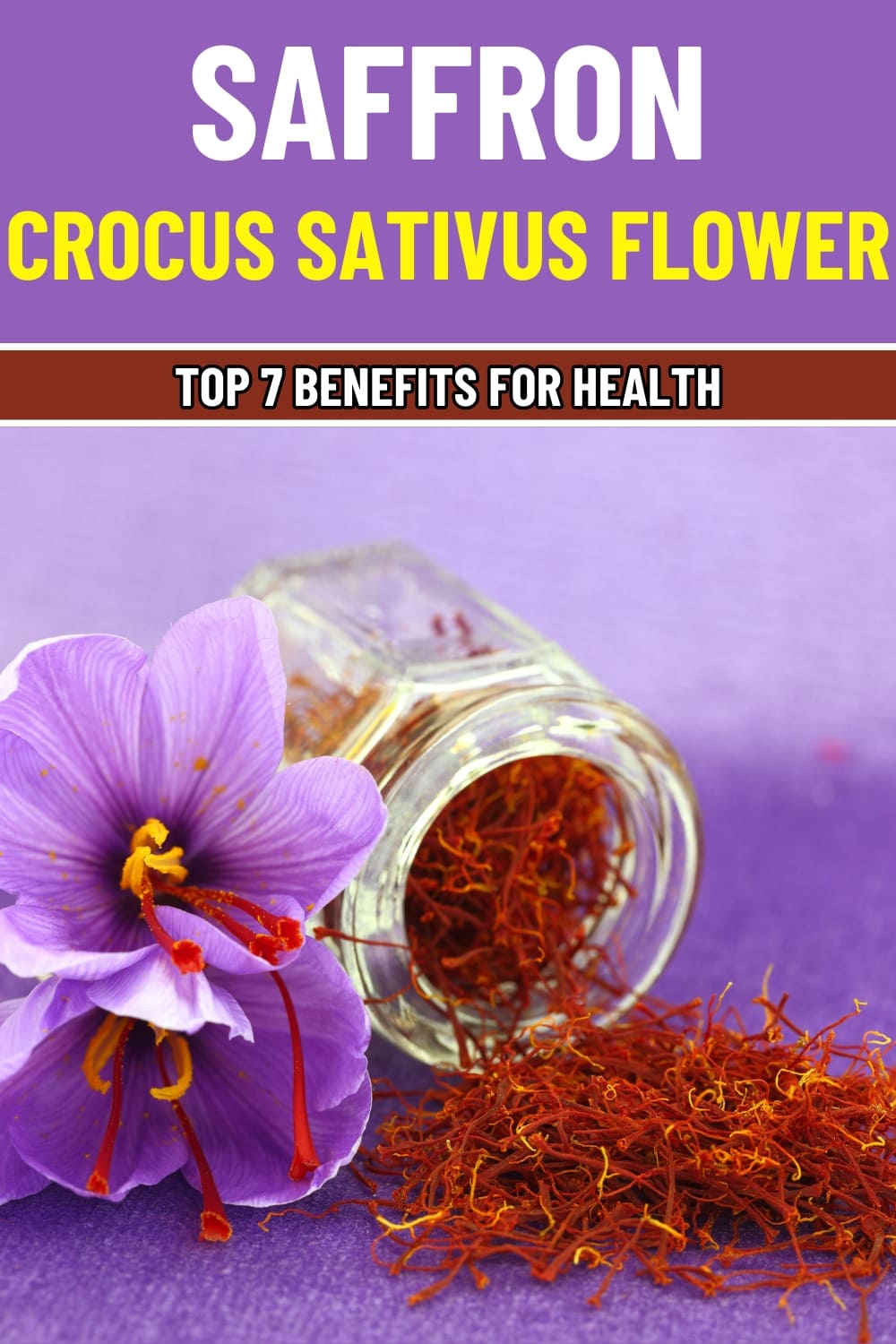Saffron, known as the “golden spice,” is derived from the Crocus sativus flower and is native to the Mediterranean, particularly Iran, India, and Greece.
Famous for its vibrant hue and unique aroma, saffron has been cherished for centuries in medicine, cuisine, and beauty routines.
Moreover, it offers a wealth of scientifically proven benefits, ranging from enhancing mood to supporting heart health.
So, keep reading to uncover why saffron isn’t just a culinary treasure but also a wellness powerhouse with endless possibilities.
#1. Rich in Potent Antioxidants
Saffron is loaded with powerful antioxidants like crocin, crocetin, and safranal, which work together to neutralize free radicals.
As a result, these compounds help protect your cells from damage while reducing inflammation and lowering the risk of chronic diseases.
In fact, saffron contains approximately 500 mg of antioxidants per 100 grams, including essential nutrients like vitamin C and manganese, which further contribute to its health-promoting properties.

#2. Enhances Mood and Fights Depression
Several studies show that saffron can improve mood by increasing serotonin levels in the brain.
For example, a study by the Journal of Ethnopharmacology in 2013 found that consuming 30 mg daily can be as effective as some antidepressants for mild to moderate depression.
Additionally, its mood-boosting effects also help combat stress and anxiety, making it a natural option for emotional well-being.
#3. Supports Heart Health
Saffron’s crocetin helps reduce cholesterol levels and improve blood flow, which is essential for preventing arterial blockages and lowering blood pressure.
Therefore, incorporating saffron into your routine can be a heart-friendly choice for maintaining cardiovascular health.
Additionally, saffron is rich in potassium, with 80 mg per 100 grams, a mineral vital for maintaining healthy heart function and regulating blood pressure.

#4. Boosts Vision and Prevents Eye Disorders
Crocin in saffron protects the retina from damage and delays the progression of age-related macular degeneration (AMD).
According to clinical trials, saffron supplementation has even shown improvements in vision clarity, offering hope to those dealing with eye disorders.
#5. Alleviates Premenstrual Symptoms
For women, saffron offers significant relief from alleviating premenstrual symptoms (PMS), such as mood swings, cramps, and fatigue.
A 2015 study titled “The Effect of Saffron Aroma on Premenstrual Syndrome Symptoms: A Randomized Controlled Trial” revealed that inhaling saffron aroma reduced PMS symptoms in over 60% of participants.

#6. Promotes Glowing Skin
With its anti-inflammatory and brightening properties, saffron reduces pigmentation, scars, and acne.
Furthermore, it is packed with vitamin B6, which supports healthy skin by improving hydration and elasticity.
In every 100 grams, saffron contains 2 mg of vitamin B6, making it a valuable addition to your skincare routine for maintaining a radiant complexion.
#7. May Protect Against Cognitive Decline
Crocin in saffron has neuroprotective effects, improving memory and preventing Alzheimer’s-related damage.
For instance, a clinical trial in the Journal of Psychopharmacology found that saffron improved cognitive performance in older adults, which underscores its potential for promoting brain health.

How to Use Saffron
1. For Cooking
Saffron can add an exquisite flavor and vibrant color to your favorite dishes. To bring out its best, infuse a few strands in warm water or milk before incorporating them into recipes like biryani, risotto, or desserts.
This simple step enhances both the aroma and appearance of your meals, making them truly special.
Additionally, you can create a soothing saffron tea by steeping 2–3 strands in hot water and adding honey for a comforting and flavorful drink perfect for relaxation.
2. For Skin Care
For a natural brightening treatment, mix saffron with milk or yogurt and apply it as a face mask. This combination not only rejuvenates your skin but also helps reduce pigmentation and scars.
You can also prepare saffron-infused water to use as a toner, which adds a natural glow to your complexion while keeping your skin refreshed and hydrated.
3. For Health
Incorporating saffron into your health regimen is simple yet rewarding. A great way to enjoy its benefits is by mixing 30 mg of saffron in warm milk for daily consumption, which supports overall well-being.
Alternatively, saffron supplements are available for those seeking a convenient option, but it’s essential to follow medical guidance to ensure safe and appropriate dosage.
Whether you choose saffron in its pure form or as a supplement, its health-boosting properties make it a worthy addition to your lifestyle.

Cautions and Precautions
While saffron offers numerous benefits, moderation is key to avoiding side effects. Consuming over 5 grams in a day can lead to nausea, dizziness, or allergic reactions.
Moreover, pregnant women should avoid excessive saffron intake, as it may induce uterine contractions, which could be harmful.
Additionally, individuals on blood thinners or antidepressants should consult their doctor before use to avoid potential interactions.
For maximum safety, always source saffron from reputable suppliers to ensure its purity and authenticity.
Disclaimer
This article is for informational purposes only and should not replace professional medical advice.
Therefore, always consult your healthcare provider before incorporating saffron into your diet or wellness routine.

Why Saffron is Worth Its Weight in Gold: Health Benefits Backed by Science
